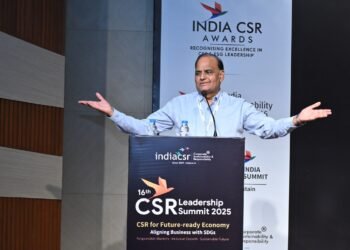Interview with Dr. Rene Schmidpeter for India CSR Leadership Series with Nayan Mitra
NEW DELHI: The India CSR Leadership Series with Nayan Mitra is all about bringing in the best to the audience for holistic understanding of the various layers of CSR, Sustainability, Corporate Governance in the words and thoughts of stalwarts. And, it is this endeavour that brings to you today the much acclaimed Prof. Dr. Rene Schmidpeter from Cologne Business School, Germany. Rene has very recently co-edited the first-ever book on CSR in India in the post mandate period that has been extremely well accepted in the international market.
What compelled you to start the Centre for Advanced Sustainable Management (CASM) in Cologne Business School?
Due to significant socio-economic and technological changes, Sustainable Management has become the new business paradigm for the 21st century. Digitalization and Globalization of our economies are not only changing the way how we work but also our entire business models. The goal of our Centre is to become a preferred partner for global business, think-tanks and universities in order to develop new solutions and management tools for this new management era.
As a researcher, what are the recent trends in Corporate Social Responsibility (CSR) that you have observed world over?
All around the world you can see that CSR is changing from a re-active to a pro-active management approach. Businesses are about to develop new value creation strategies and strengthen their positive impact on society. Business examples from leading companies show how sustainability and profitability can be achieved simultaneously. The implications of this new business paradigm and the next steps in the transition of business will have a huge effect on management education and the way how we conduct business in the future.
If you were to name one key challenge of CSR that is faced by corporations in these days. What would it be?
The key challenge for business to be successful in the future will be to contribute to the sustainable development of our societies. The sustainable development goals of the United Nations (SDGs) clearly show the key issues for our planet and all countries around the world. In the future only business models which have a positive impact to society will survive. Key drivers for this change will be digitalization, transparency and sustainability – all of which are challenging the way of how we do business at the moment. Over the next years a lot of businesses have to change their business model as well as their corporate culture.
What are the ways to overcome this challenge?
Innovation is key in order to create more positive impact for society. Business needs to develop innovative products and services for the real needs of their customers. This is only possible if business changes their corporate culture by fostering diversity, flexibility and reduce hierarchy. Only through stakeholder collaboration, sustainable management and responsible leadership the challenges of the future can be met.
How is the CSR scenario in Germany different from that of India?
In Germany we have a long tradition of responsible business practices based on our economic system called social market economy. German business always saw social and environmental responsibility as a key requirement for economic success. At the same time Germany has a deep understanding of quality – Made in Germany is world-known. Today sustainability becomes an integral part of the quality understanding of German companies. Within the European Union companies are obliged to report on their CSR processes and goals – which is fostering the CSR idea all over Europe. India as a growing market economy is developing its own approach of CSR linking business success to societal development. India, thus becomes an important advocate for the global CSR movement and a good partner for German businesses. Both countries see CSR as an integral part of business success and should exchange best-practice and innovative CSR instruments in order to learn from each other.
You have very recently co-edited the book, ‘Corporate Social Responsibility in India: Cases and Developments after the legal mandate.’ What induced you to do so? How was your experience?
India is an important market in Asia and a good partner for German businesses. As Germany has a long history of sustainability it is important for us to also learn about the CSR understanding in different cultures and other regions in the world. After travelling 50 countries in order to conduct research about the different understandings of sustainable management and after organizing a global CSR conference in Cologne it was a great honor for me to edit a book on CSR in India together with the globally well respected colleague Nayan Mitra. After doing so I see India as an important partner for the global CSR movement and hope to learn more about this interesting country and market.
What would be your message to the next generation of CSR academics and practitioners?
CSR is becoming the new normal – the way how to manage a business successfully. Especially the leaders of tomorrow need to understand the why, how and what of sustainable management. Therefore we need business leaders, academic teachers and innovative politicians to work together to overcome the challenges of the future. They need to be role-models, teachers and value creators for the next generation. We need to generate new knowledge how to reconnect business and society and create value for business and society at the same time.
About Dr. Rene Schmidpeter:
Prof. Dr. René Schmidpeter holds the Dr. Juergen Meyer Endowed Chair for International Business Ethics and Corporate Social Responsibility at Cologne Business School (CBS), Germany. He is also a professor at the Nanjing University of Finance and Economics and Adjunct Professor at Murdoch University in Perth, Australia. He is a series editor for Springer’s CSR, Sustainability, Ethics and Governance books, a section editor of the Encyclopedia of Corporate Social Responsibility (ECSR) and an editor of the Dictionary of Corporate Social Responsibility (DCSR) as well as Editor-in-Chief of the International Journal of CSR (Springer). His research and teaching activities focus on the management of Corporate Social Responsibility, international perspectives on CSR, Social Innovation and Sustainable Entrepreneurship as well as the relationship between business and society.
About Nayan Mitra
Nayan Mitra comes with a rich mix of diverse professional experience of over sixteen years. She straddles seamlessly between academics, social and corporate sectors. As a Developmental Consultant and Researcher, she works closely with some of the eminent Corporations and not-for profits of India as well as being in their Advisory and Board level. She has conducted several social researches for multi-lateral agencies; the findings of which have become important bases for sustainable action. She has been a resource person in eminent Institutions of higher learning in the areas of CSR and Corporate Governance and has important peer reviewed research publications to her credit in national and international Academic journals and books as well as delivered at key Conferences. Her book, ‘Corporate Social Responsibility in India: Cases and Development after the Legal Mandate’ alongwith co-editor Dr. Rene Schmidpeter is a first book of its kind that charters the development of mandated Indian CSR from a multi-stakeholder perspective, bringing in over 15 authors. This Book was first launched in Cologne, Germany and only recently released by the U.S Consul General in India, Mr. Craig Hall. She spearheads the India CSR Leadership Series by India CSR, where she has brought together distinguished leaders like Dr. Bhaskar Chatterjee, Mr. Shankar Venkateswaran. She was a finalist of the prestigious Chevening Gurukul Scholarship for Leadership and Excellence – 2013, as conferred by the Foreign and Commonwealth Office (FCO) of the British Deputy High Commission.






















